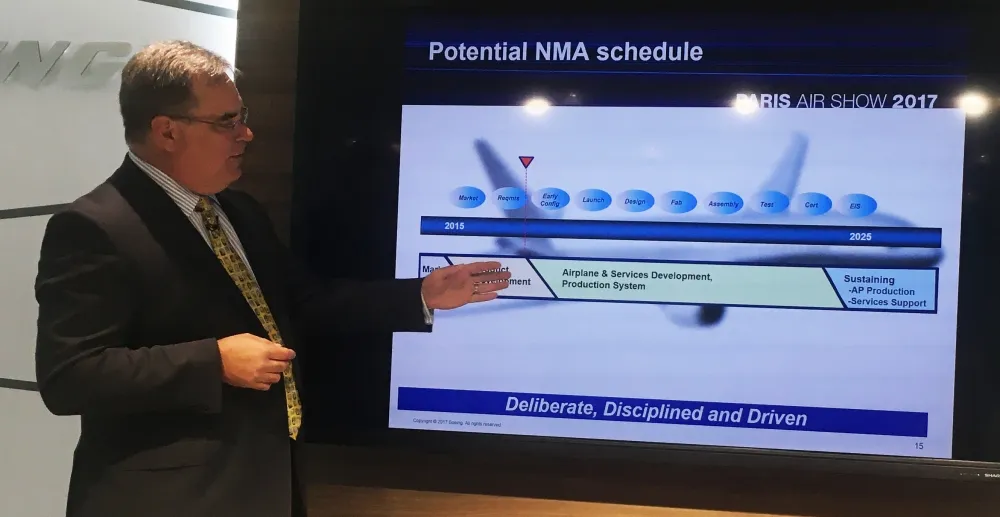
Boeing plans super efficient jet for smaller markets
Jun 27, 2017

Boeing is developing a new generation of super-efficient jets aimed at serving smaller markets, responding to the growing demand for regional air travel. This innovative aircraft is designed to optimize fuel efficiency and operational costs, making it an attractive option for airlines looking to expand their services to underserved routes. With a focus on sustainability and advanced technology, the jet will incorporate lighter materials and improved aerodynamics. Boeing's initiative seeks to enhance connectivity between smaller cities and major hubs, ultimately fostering economic growth and improving passenger access to air travel in less trafficked regions.
Boeing has announced its ambitious plans to develop a super efficient jet aimed at catering specifically to smaller markets. This strategic move is not only about enhancing their aircraft lineup but also about addressing the evolving needs of air travel in regions that are often overlooked by larger aircraft. The new jet is designed to provide airlines with greater operational flexibility and lower costs while ensuring a superior travel experience for passengers.
The Need for Efficient Aircraft in Smaller Markets
As the aviation industry continues to recover from the impacts of the pandemic, there is a significant demand for air travel in smaller, underserved markets. Traditional jets, while efficient for larger routes, often fall short when it comes to optimizing costs and capacity for these smaller destinations. Boeing's super efficient jet aims to fill this gap by offering enhanced fuel efficiency, reduced emissions, and improved passenger comfort.
Key Features of Boeing's Super Efficient Jet
Several innovative features set Boeing's new aircraft apart from traditional jets. These include:
| Feature | Description |
|---|---|
| Advanced Aerodynamics | The aircraft will utilize cutting-edge designs to minimize drag and optimize fuel consumption. |
| Next-Generation Engines | Equipped with state-of-the-art engines that promise significant improvements in fuel efficiency and reduced noise levels. |
| Enhanced Cabin Comfort | Designed with passenger comfort in mind, featuring larger windows and improved seating arrangements. |
| Modular Design | Offers flexibility in configurations to cater to different airline needs and market demands. |
Market Potential and Strategic Implications
The introduction of Boeing's super efficient jet is positioned to capitalize on the growing demand for air travel in smaller markets. According to industry analysts, the market for regional air travel is expected to grow significantly over the next decade. Airlines are increasingly looking for solutions that not only reduce operational costs but also align with sustainability goals.
Boeing's commitment to sustainability is evident in the design of this new aircraft. The focus on reducing emissions and improving fuel efficiency is crucial as airlines face increasing pressure to meet environmental standards. By catering to smaller markets with a super efficient jet, Boeing not only strengthens its product portfolio but also positions itself as a leader in sustainable aviation.
Competitive Landscape
The aviation market is highly competitive, with several manufacturers vying for dominance in various segments. Boeing's main competitor, Airbus, is also exploring opportunities in the regional jet market. However, Boeing's focus on efficiency and adaptability may provide it with a distinct advantage.
Airlines are likely to evaluate the operational economics of Boeing's new aircraft against existing models from both Boeing and Airbus. The super efficient jet is expected to offer lower operating costs per seat, making it an attractive option for regional operators.
Challenges Ahead
While the prospects for Boeing's super efficient jet are promising, challenges remain. Development timelines can be unpredictable, and ensuring that the aircraft meets regulatory standards is crucial. Additionally, Boeing must navigate supply chain issues that have affected the aviation industry in recent years.
Moreover, market acceptance will hinge on airlines' willingness to invest in new aircraft types. Boeing will need to demonstrate the aircraft's reliability and efficiency through rigorous testing and validation processes. Building strong relationships with airlines will be essential to ensure successful market adoption.
Conclusion
Boeing's plans for a super efficient jet aimed at smaller markets represent a significant opportunity for both the company and the airlines that will operate these aircraft. With a focus on innovation, sustainability, and cost-effectiveness, this new jet could redefine regional air travel. As the aviation industry continues to evolve, Boeing's commitment to addressing the unique needs of smaller markets will be pivotal in shaping the future of air travel.
By investing in this super efficient jet, Boeing is not only responding to current market demands but also setting the stage for a more sustainable and efficient future in aviation. As airlines look to enhance their fleets and meet passenger expectations, this next-generation aircraft may play a critical role in the industry's recovery and growth.
Related Articles

Explore Thailand: The Best Islands to Visit for Paradise, Adventure, and Relaxation

The Ultimate Guide to the Best Islands in Thailand for Your Next Getaway

Do babies need passports? How to get a passport for a newborn

How to get a U.S. passport fast: here’s how to expedite the process

What is Mobile Passport Control: 5 reasons why you should use it

SENTRI vs. Global Entry: A detailed guide

Do you need a passport to go to the Bahamas? Let’s find out

Do you need a passport to go to Mexico? A detailed guide

Do you need a passport to go to Canada? We got the answer

Do You Need a Passport for a Cruise: An Essential Travel Guide

Booster Seat Requirements: All the Rules to Follow in Your Rental Car

What Are the World’s Most Powerful Passports, and How Does Yours Rank?

How to Take a Passport Photo at Home: A Helpful Guide

You've got to have heart! Southwest's new livery

Your opinion: Should water be free on low cost carriers?

Young women bolder than guys as solo travellers
